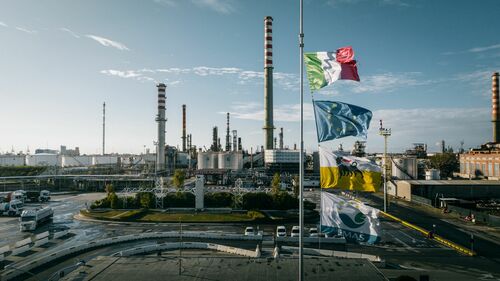Eni moves ahead with conversion of its third refinery into a bio-refinery, at Livorno, Italy
Livorno – Eni confirms its decision to build Italy's third bio-refinery in Livorno. The project, first announced in October 2022 and followed by an application for Environmental Impact Assessment (EIA) in November 2022, is awaiting official authorisations and includes the construction of three new facilities for the production of hydrogenated biofuels: a biogenic feedstock pre-treatment unit; a 500,000 tonnes/year Ecofining™ plant; and a facility to produce hydrogen from methane gas.
The conversion of the Livorno industrial site, following other successful conversions in Porto Marghera (2014) and Gela (2019), confirms Eni's decarbonization strategy, which aims to achieve carbon neutrality by 2050 and increase bio-refining capacity from the current 1.65 million tonnes/year to over 5 million tonnes/year by 2030.
In line with the strategic decision to convert the Livorno refinery, future-proofing the site in terms of production and employment, Eni has stopped importing crude oil and initiated the shutdown of the lubricants production lines and Topping plant. Fuel distribution in the area will be guaranteed through the import of finished and semi-finished products.
Preparatory work for the construction of the three new bio-refining plants is underway, with construction to commence following regulatory approval. Completion and commissioning are expected by 2026.
The plants will process various biogenic feedstocks, mainly vegetable waste and residue, to produce HVO diesel, HVO naphtha and bio-LPG. Eni, through Enilive, is the second-largest producer of hydrogenated biofuels (HVO) in Europe and the third-largest in the world.
Eni’s growth strategy is driven by the increasing demand in Europe and Italy for biofuels in the mobility sector, both to meet the emission reduction targets set out in the recently approved RED III (Renewable Energy Directive) and to comply with Italian legislation requiring the introduction of pure biofuels. Forecasts predict a 65% increase in demand for hydrogenated biofuels globally between 2024 and 2028.
*Report IEA Renewables 2023, Main Case, Analysis and forecast to 2028
Latest news
Vulcan and BASF have signed a memorandum of understanding to explore the use of geothermal energy at the Ludwigshafen site, Germany
BASF SE, Ludwigshafen →Geothermal heat to generate up to 4 million metric tons of CO2-free steam Thermal water offers opportunity for resource-efficient extraction of lithium. Regional energy suppliers investigate use o...
Exolum starts the world’s first demonstration of transport and storage of green hydrogen in existing terminal infrastructure through carrier liquids (LOHC)
The globally pioneering scheme establishes a new model for fast, flexible and efficient green hydrogen transport and storage in the UK by leveraging existing tank storage and pipeline infrastructur...
BASF to build additional production capacity for X3D® catalyst shaping technology in Ludwigshafen, Germany
BASF SE, Ludwigshafen →X3D® technology produces catalysts with optimal shapes to maximize performance and efficiency while minimizing energy consumption. Capacity needed to meet high market demand for X3D products. First...
BASF celebrates opening of new production line in Heerenveen, the Netherlands
Strategic products with a sustainable focus. Production capacity grows without additional CO2 emissions. Green electricity from wind farm Hollandse Kust Zuid joint venture
